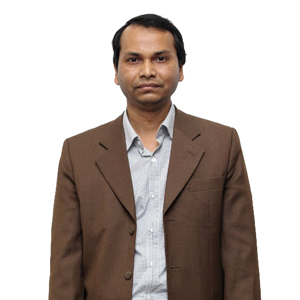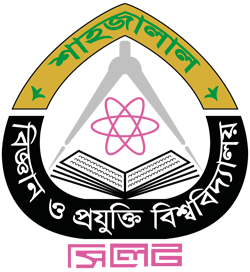Shahjalal University of Science and Technology
Faculty Profile

Dr Mohammad Jalilur Rahman
Professor
Contact Information
- Office Address: Professor Institute of Shahjalal University of Science and Technology, Sylhet-3114, Bangladesh
- Phone: +8801726887768
- Email: jalil-che@sust.edu, mjrche@yahoo.com
Biography
Dr. M. Jalilur Rahman studied at Jahangirnagar University, Bangladesh and successfully completed his Bachelor of Science (B.Sc.) with Honors in Chemistry and Master of Science (M.Sc.) in Chemistry in the years of 1995 and 1996 respectively. He joined as a Lecturer in the Department of Chemistry, Shahjalal University of Science and Technology (SUST), Sylhet, Bangladesh in 19 February 2001. For higher studies, he moved to Tokyo Metropolitan University (TMU), Japan with a study leave from SUST in the beginning of October 2003 under the Japanese Government Monbukagakusho (MEXT) Scholarship. During his study in Japan he was promoted to an Assistant Professor in the Department of Chemistry SUST. At Tokyo Metropolitan University, he successfully carried out his study and research on macrocyclic oligoarylenes under supervision of Prof. Dr. Masahiko Iyoda. There he was awarded Doctor of Science (D.Sc.) at the end of March 2007. After getting back from Japan in 2007, he joined as an Assistant Professor in the Chemistry Department SUST and was upgraded into an Associate Professor there at the middle of August 2008. There he conducted organic chemistry related courses and supervised several undergraduate and graduate students for their thesis. In the beginning of June 2010, he moved again to Tokyo Metropolitan University, Japan with a study leave from SUST for his post-doctoral research with a JASSO fellowship followed by a JSPS fund. After completion of his post-doctoral research, he got back to SUST at the end of February 2012 and joined as an Associate Professor. He was upgraded there into a full Professor at the end of June 2013. He supervised many undergraduate and graduate students for their research projects. His current research interests are development of new methodology for carbon-carbon bond formations and synthesis of functional pi-electron systems.
Education
- Doctor of Science (D.Sc.) in Organic Chemistry from Tokyo Metropolitan University, Japan
- M.Sc. in Chemistry from Jahangirnagar University, Bangladesh
- B.Sc. (Hons.) in Chemistry from Jahangirnagar University, Bangladesh
Research Interests
- Organic Synthesis, Transition metal-catalyzed coupling reactions, Synthesis of functional pi-electron systems
Journal Publish
- 1. A. Yousuf , M. A. Rahman, M. J. Rahman, M. S. Hossain, (2022). Role of catalysts in sustainable production of biojet fuel from renewable feedstocks. In A. Yousuf & C. Gonzalez-Fernandez (Eds), Sustainable Alternatives for Aviation Fuels (pp 125-176). Elsevier (Book Chapter), https://doi.org/10.1016/B978-0-323-85715-4.00006-9
- 2. M. J. Rahman, M. A. Malek, R. Pervin, S. A. Begum, Electron-Transfer Oxidation of Organo-Cuprates with Benzophenone: Synthesis of Biaryls, Int. J. Chem. Stud., 9 (2021), 41-44.
- 3. M. J. Rahman, M. Alahy, M. A. Malek, S. Jannat, R. Pervin, S. A. Begum, Synthesis of biaryls through electron-transfer oxidation of organo-cuprates with benzil, Int. J. Chem. Stud., 5 (2017) 162-165.
- 4. M. J. Rahman, H. Shimizu, M. Hasegawa, M. Iyoda, Pentadecaphenylenes: Synthesis, self-assembly and complexation with fullerene C60, Org. Chem. Front., 4 (2017) 882-890.
- 5. M. J. Rahman, R. Pervin, R. Hasan, D. Debnath, Iron(III) Catalyzed Coupling of Aryl Halides: Synthesis of Terphenyl and Biphenyl Derivatives, J. Sci. Res., 5 (2013) 127-134.
- 6. M. J. Rahman, S. Shimizu, Y. Araki, H. Ikeda, M. Iyoda, Synthesis of pentadecaphenylenes, their inclusion properties, and nanostructure formation with C60, Chem. Commun., 49 (2013) 9251-9253.
- 7. Y. Hanai, M. J. Rahman, J. Yamakawa, M. Takase, T. Nishinaga, M. Hasegawa, K. Kamada, M. Iyoda, Synthesis and Nanostructures of Cyclic Triphenylene Trimers Having Long Alkyl and Alkoxy Side-Chains, Chem. Asian J., 6 (2011) 2940-2945.
- 8. M. Iyoda, J. Yamakawa, M. J. Rahman, Conjugated Macrocycles: Concepts and Applications, Angew. Chem. Int. Ed., 50 (2011) 10522-10553.
- 9. M. J. Rahman, J. Yamakawa, A. Matsumoto, H. Enozawa, T. Nishinaga, K. Kamada, M. Iyoda, Synthesis of Nonaphenylenes and Dodecaphenylenes Using Electron-Transfer Oxidation of Lipshutz Cuprates and Formation of Nanostructural Materials from Hexadodecyloxynonaphenylene, J. Org. Chem., 73 (2008) 5542-5548.
- 10. M. J. Rahman, T. Haque, Construction of Biaryls Using Electron-Transfer Oxidation of Organo-cuprates Derived from Grignard Reagents, Jahangirnagar University Journal of Science, 30 (2007) 31-36.
- 11. Y. Miyake, M. Wu, M. J. Rahman, Y. Kuwatani, M. Iyoda, Efficient Construction of Biaryls and Macrocyclic Cyclophanes via Electron-Transfer Oxidation of Lipshutz Cuprates, J. Org. Chem., 71 (2006) 6110-6117.
- 12. M. A. Hashem, M. J. Rahman, Bromoacetoxylation of monoalkenes, dienes and carbohydrate derived enol-ethers initiated by iodine(III) compounds in the presence of tetraphenylphosphonium bromide, J. Bangladesh Chem. Soc., 18 (2005) 49-56.
- 13. Y. Miyake, M. Wu, M. J. Rahman, M. Iyoda, Novel electron-transfer oxidation of Lipshutz cuprates with 1,4-benzoquinones: an efficient homo-coupling reaction of aryl halides and its application to the construction of macrocyclic systems, Chem. Commun., (2005) 411-413.
- 14. M. Iyoda, M. J. Rahman, A. Matsumoto, M. Wu, Y. Kuwatani, K. Nakao, Y. Miyake, Synthesis of Nonaphenylenes and Dodecaphenylenes Using Electron-Transfer Oxidation of Lipshutz Cuprate Intermediates, Chem. Lett., 34 (2005), 1474-1475.
- 15. M. A. Hashem, M. J. Rahman, K. Parvin, Iodine(III) initiated bromoacetoxylation of cyclic dienes, J. Bangladesh Chem. Soc., 17 (2004) 146-152.
- 16. M. A. Hashem, K. Parvin, and M. J. Rahman, Iodine(III) initiated bromoacetoxylation of monoalkenes, cycloalkenes and carbohydrate derived enol-ethers, J. Bangladesh Chem. Soc., 15 (2002) 162-184.
Teaching
- Organic Chemistry, Stereochemistry, Organic Reaction Mechanism, Chemistry of Natural Products, Organic Reagents and Syntheses, Spectroscopic Methods in Structural Analysis, etc.
